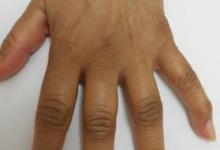Best of 2018: The Millennial Doctor- Mighty or Mediocre? Save

A 3rd year medical student started his rotation with me this past week. With the new medical school curriculum, students are allowed 2-week rotations to explore specialties they might want as a career. The student chose to come to my office to experience rheumatology even though he felt certain he will go into dermatology.
With this in mind, I was excited to show him how and where the fields of rheumatology and dermatology overlap. Each patient we saw had a teaching point: I showed him that sarcoidosis activity can be gauged by the induration and swelling of a patient’s tattoos, that nail psoriasis is highly associated with enthesitis, that cutaneous lupus can flare under compact fluorescent light because of the UV rays emitted from these lightbulbs.
My patients were gracious to permit the student examine their bodies and provided opportunities to let him ask questions. I would give him synopses of the diseases we encounter. You would expect that he would be enthralled as a student seeing and learning about patients rarely encountered by other specialties.
Instead, he yawned. He declined the opportunity to watch a musculoskeletal ultrasound evaluation of an inflamed joint; he refused an offer by my partner to give him PowerPoint slides of the game “Dermatology Jeopardy.” I asked him to read about the diseases we encountered and lent him a copy of Dr. Cush’s book Rheumatology Diagnostics and Therapeutics, (aka RheumaKnowledgy.com); he barely opened it, and stated, “I don’t like to read.”
I was irritated. Why am I wasting my time on an unmotivated, ungrateful, immature dermatology wannabe? I knew that I can call up the school dean of student affairs to complain about his behavior and give him a bad review. I decided not to ruin his day and make him remember rheumatology with being reprimanded by the dean and destroying his career.
I accepted my role as his teacher when I allowed him to walk into my clinic. When students do not perform, whose fault is it? What should you do? I decide to go for the shock factor.
He was in the middle of presenting a patient when I stopped him mid-sentence and asked him, “What is the difference between a great doctor and a mediocre one?” He stammered, rubbed his eyes, and replied, “Huh?”
I repeated the question slowly and clearly in the event he had wax in his ears. He blinked and listed a few traits, “Intelligence, compassion, good listener, prompt.”
I told him he was wrong.
“The best doctors have two traits - curiosity and never giving less than 100%”.
Why these two qualities? Curiosity is very important— this is the impetus for learning; this is the reason why we are able to come up with new cures for difficult to treat diseases and why we have been able to improve the average lifespan of humans from 40 years of age to >80.
In addition, a great doctor always give it their all even at personal sacrifice; remember the phrase, “the surgeon has the bladder of steel, a cast iron stomach, and a heart of gold?” He was astute to catch that the original question I asked may have pertained to his performance.
The medical student promptly asked me if I thought he was going to be a mediocre doctor. I took my time to answer— there’s tremendous power and sweat in a well place pause!
I told him that at this time, it is his decision if he wants to be Mighty or Mediocre and that it is my hope that he chooses the path that our forefathers have paved in medicine. I asked him to think about why he applied to medical school. If he wanted money, he should have been a businessman. If he is looking for fame, why not run for a political office or be an entertainer? But wait, to be great in these other professions, it also is important to have curiosity and to give it your all.
He seemed abashed and cleared his throat. I can see the flush creeping up from his shirt collar. I told him that my purpose of bringing this to his attention is not to embarrass him, but because I have high hopes that he will be a great doctor. Author Malcom Gladwell has his theory that to be great at something, one must devote more than 10,000 hours to that practice. The medical student asked me what he should do.
I told him he needed to start reading. Harrison’s Principles of Internal Medicine is a good book to start with.
Epilogue: After our tete-a-tete, the final days of the rotation with my student were really good. It was like veil had been lifted from his eyes and his mind. He was asking questions, jumping at the chance to look up clinically relevant questions, volunteering to stay late and come in early to get a head start on learning about the patients who are on the schedule.
Maybe I should ask each new student who come for the rotation, “What is the difference between a great doctor and a mediocre one?”
(Author Disclosure: The medical student portrayed in the article represents various students and residents I had encountered over the years; any semblance to individuals is purely coincidental)










If you are a health practitioner, you may Login/Register to comment.
Due to the nature of these comment forums, only health practitioners are allowed to comment at this time.